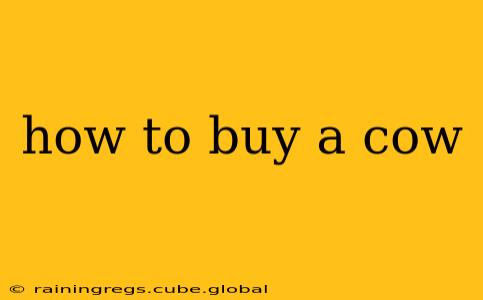How to Buy a Cow: A Comprehensive Guide for First-Time Buyers
Buying a cow can be a rewarding experience, whether you're starting a small farm, raising beef for personal consumption, or seeking a reliable source of milk. However, it's a significant undertaking requiring careful planning and research. This guide will walk you through the essential steps to ensure a smooth and successful cow purchase.
What Kind of Cow Should I Buy?
This is arguably the most crucial first step. The ideal breed depends heavily on your intended use:
- Dairy Cows: Breeds like Holstein Friesian, Jersey, and Guernsey are known for high milk production. Consider factors like milk yield, butterfat content, and disease resistance when choosing a dairy breed.
- Beef Cows: Angus, Hereford, and Charolais are popular beef breeds, each offering different characteristics in terms of growth rate, meat quality, and hardiness. Think about your climate and desired meat characteristics.
- Dual-Purpose Cows: Some breeds, such as Brown Swiss and Milking Shorthorn, offer a balance of milk and meat production, making them suitable for smaller operations.
Consider your experience level too. Beginner cow owners might benefit from a hardy, docile breed known for its ease of management.
Where Can I Buy a Cow?
Several avenues exist for purchasing cows:
- Local Farmers and Ranchers: This allows you to see the cow in person, assess its health and temperament, and build a relationship with the seller. Ask about the cow's history, including its diet, health records, and breeding information.
- Livestock Auctions: Auctions can offer competitive prices, but it requires experience to assess the animals' condition and value effectively. Thoroughly inspect any cow you are considering bidding on.
- Online Marketplaces: Several online platforms connect buyers and sellers of livestock. Exercise caution, verify seller legitimacy, and ideally, arrange an in-person inspection before finalizing a purchase.
What Should I Look For When Inspecting a Cow?
A thorough inspection is crucial to avoid buying a sick or unhealthy animal. Pay close attention to:
- Body Condition: A healthy cow should have a good weight, smooth coat, and bright eyes. Look for any signs of malnutrition or illness.
- Temperament: A calm and docile temperament is essential, especially if you're a beginner. Observe the cow's reaction to your presence and handling.
- Teeth and Mouth: Examine the cow's teeth to assess its age and overall health.
- Udders (for Dairy Cows): Check for any signs of infection, such as lumps, swelling, or discharge.
- Legs and Feet: Look for any lameness, swelling, or injuries.
- Ask for Veterinary Records: Reliable sellers will provide detailed health records.
How Much Does a Cow Cost?
The price of a cow varies widely based on breed, age, health, and production capabilities. A young, healthy cow can range from a few hundred to several thousand dollars. Factor in additional costs such as transportation, veterinary care, feed, and housing.
What Do I Need to Prepare Before Bringing a Cow Home?
Before bringing your new cow home, ensure you have the following:
- Adequate Housing: A safe and comfortable shelter, including a barn or pasture with sufficient space.
- Feed and Water: Access to clean water and appropriate feed based on the cow's breed, age, and stage of production.
- Veterinary Care: Establish a relationship with a veterinarian experienced in bovine care.
- Fencing: Secure fencing to prevent the cow from escaping.
What are the ongoing costs of owning a cow?
Owning a cow is not a cheap endeavor. Ongoing costs include:
- Feed: This is often the largest expense, particularly during the winter months or periods of lactation for dairy cows.
- Veterinary care: Routine check-ups, vaccinations, and treatment for illnesses.
- Housing maintenance: Repairs and upkeep of your barn or other facilities.
- Manure management: The proper disposal or utilization of manure.
By following these steps and conducting thorough research, you can increase your chances of a successful cow purchase and embark on a rewarding agricultural journey. Remember that responsible cow ownership requires dedication, knowledge, and ongoing care.
